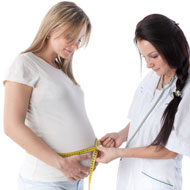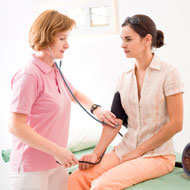- General Articles
- General Pregnancy Questions
- Baby Growth
- Pregnancy Diet
- Miscarriage
- During Pregnancy
- Twin Pregnancy
- Toddler Meals
- Home Remedies During Pregnancy
- Breastfeeding
- Pregnancy Week By Week
- Pregnancy Tests
- Ectopic Pregnancy
- Pregnancy Signs and Symptoms
- Pregnancy Stages
- Potty Training
- Fetal Development
- Preschooler
- Postpartum Depression
- Toddler Illness
- Baby Care
- After Pregnancy
- Molar Pregnancy
- During Delivery
- Beauty and Style
- Pregnancy Clothing
- Preconception
- Fertility
How Your Body Changes During Pregnancy
An expectant woman’s life is dotted with body changes during pregnancy, week by week bringing different experiences. During what is calculated as the first two weeks of pregnancy, a woman is not actually pregnant as the pregnancy term is calculated based on the last menstrual period. Successful fertilization of a mature egg by a sperm at the time of ovulation is actually when the pregnancy begins. The two weeks following fertilization see the fertilized egg making its way from the fallopian tube into the uterus to embed itself in the uterine wall.
From the rich blood vessels in the uterine wall, the baby will derive its nutrition. This process is called implantation and the expectant mother may experience slight abdominal cramps and mild spotting as a result of the burrowing action of the zygote. A rise in hCG levels in the blood stream causes mood swings, headaches and fatigue which are common female body changes during pregnancy, experienced during the first twelve to thirteen weeks of pregnancy.
Nausea, vomiting and food cravings and aversions are also experienced due to these hormones through the first trimester. However, some women are known to experience these symptoms throughout their pregnancy term. The hormone production also results in tenderness and enlargement of breasts as the glands in the breasts get stimulated and prepare to produce milk. The hormones also make the digestive system sluggish. This results in heartburn, indigestion and constipation. The iron supplements taken during pregnancy also result in constipation. The increase in blood circulation to the pelvic region causes an increase in the frequency to urinate. Water retention causes swelling in the limbs.
At the uterus expands, during the initial period of the pregnancy, the abdomen expands upwards to accommodate the growing baby. As a result of this, the lower ribs and the diaphragm spread out to make room for the expansion. This causes shortness of breath. As the weeks pass, the uterus becomes heavier, becoming almost 20 times its original weight by the end of the third trimester. The weight of the uterus strains the ligaments and the pelvic floor muscles causing occasional abdominal pain. Backaches and leg pains are also a part and parcel of pregnancy. By the end of the pregnancy term, the baby turns upside-down as it prepares to leave the safe confines of its mother’s uterus. This causes a lowering of the abdomen and is referred to as lightening. At this time, pressure is exerted on the bladder and this increases the frequency in the urge to urinate. After the birth of the baby the body recuperates from the normal body changes during pregnancy.
Read more articles from the During Pregnancy Category.



 7 Must-Haves Before Your Baby Arrives
7 Must-Haves Before Your Baby Arrives Bonding Games for Babies
Bonding Games for Babies DIY Baby Bath Towel Apron
DIY Baby Bath Towel Apron Common Late Pregnancy Fears
Common Late Pregnancy Fears